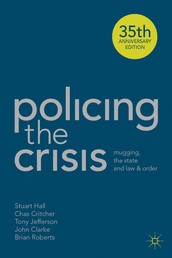VIDEO: Stuart Hall on “Policing the Crisis”
This past August, MEF executive director Sut Jhally sat down with renowned cultural studies theorist Stuart Hall at his home in London to discuss his classic work Policing the Crisis. The book, which contains essays by Hall, Chas Critcher, Tony Jefferson, John Clarke, and Brian Roberts, has stood for more three decades as a breathtaking example of “conjunctural analysis” — a form of inquiry that brings critical theory to bear on real-world practice. Next month Palgrave MacMillan will come out with the highly anticipated second edition of the book, which is widely understood to have had a formative influence on the development of British cultural studies.
 The starting point for Hall and his co-authors is a single event – the unprecedented 20-year prison term handed out in England to three teenage boys for a “mugging.” In a brilliant and far-reaching dissection of British politics and culture, the authors examine the ideological fallout from the incident, tracing how larger fears about crime and cultural disintegration paved the way for the reactionary social and economic policies of conservative British Prime Minister Margaret Thatcher.
The starting point for Hall and his co-authors is a single event – the unprecedented 20-year prison term handed out in England to three teenage boys for a “mugging.” In a brilliant and far-reaching dissection of British politics and culture, the authors examine the ideological fallout from the incident, tracing how larger fears about crime and cultural disintegration paved the way for the reactionary social and economic policies of conservative British Prime Minister Margaret Thatcher.
The result is a tour de force of cultural analysis — a close reading of the political uses of fear that continues to resonate today.
In the excerpt from the interview above, Hall describes English culture and politics at the time of the book’s publication in the late ’70s, and explains why critically engaging the cultural politics of identity, fear, and authoritarian control remains as important as ever today.

